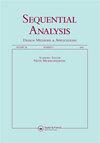Asymptotically optimal robust information-based quick detection for general stochastic models with nonparametric postchange uncertainty
IF 0.6
4区 数学
Q4 STATISTICS & PROBABILITY
Sequential Analysis-Design Methods and Applications
Pub Date : 2022-01-02
DOI:10.1080/07474946.2022.2043052
引用次数: 0
Abstract
Abstract By making use of Kullback-Leibler information, we develop a new approach for the quickest detection problem for general statistical models with dependent observations and unknown postchange distributions; the postchange distribution depends on either unknown informative parameters or unknown nonparametric infinite-dimensional nuisance functions. For such models, we introduce a robust risk as the supremum of the mean detection delay over the class of postchange distributions. On the basis of the window-limited cumulative sum rules developed by Lai in 1988, we propose new detection procedures, making use of the noise density that minimizes the Kullback-Leibler divergence. Then for the constructed detection procedures, we provide sufficient conditions on the considered statistical models that ensure minimax optimality properties with respect to the robust risk. We apply the developed methods to the quick detection problems for both scalar and multivariate autoregressive processes with unknown postchange parameters and unknown noise distributions.非参数后变不确定性随机模型的渐近最优鲁棒信息快速检测
摘要利用Kullback-Leibler信息,我们为具有依赖观测和未知变化后分布的一般统计模型的最快检测问题开发了一种新方法;变化后分布依赖于未知的信息参数或未知的非参数无穷维滋扰函数。对于这样的模型,我们引入了一个稳健的风险作为一类后变化分布上的平均检测延迟的上确界。在赖1988年提出的窗口受限累积和规则的基础上,我们提出了新的检测程序,利用噪声密度使Kullback-Leibler发散最小化。然后,对于所构建的检测过程,我们在所考虑的统计模型上提供了充分的条件,以确保关于鲁棒风险的极小极大最优性性质。我们将所开发的方法应用于具有未知后变化参数和未知噪声分布的标量和多元自回归过程的快速检测问题。
本文章由计算机程序翻译,如有差异,请以英文原文为准。
求助全文
约1分钟内获得全文
求助全文
来源期刊

Sequential Analysis-Design Methods and Applications
STATISTICS & PROBABILITY-
CiteScore
1.40
自引率
12.50%
发文量
20
期刊介绍:
The purpose of Sequential Analysis is to contribute to theoretical and applied aspects of sequential methodologies in all areas of statistical science. Published papers highlight the development of new and important sequential approaches.
Interdisciplinary articles that emphasize the methodology of practical value to applied researchers and statistical consultants are highly encouraged. Papers that cover contemporary areas of applications including animal abundance, bioequivalence, communication science, computer simulations, data mining, directional data, disease mapping, environmental sampling, genome, imaging, microarrays, networking, parallel processing, pest management, sonar detection, spatial statistics, tracking, and engineering are deemed especially important. Of particular value are expository review articles that critically synthesize broad-based statistical issues. Papers on case-studies are also considered. All papers are refereed.
 求助内容:
求助内容: 应助结果提醒方式:
应助结果提醒方式:


